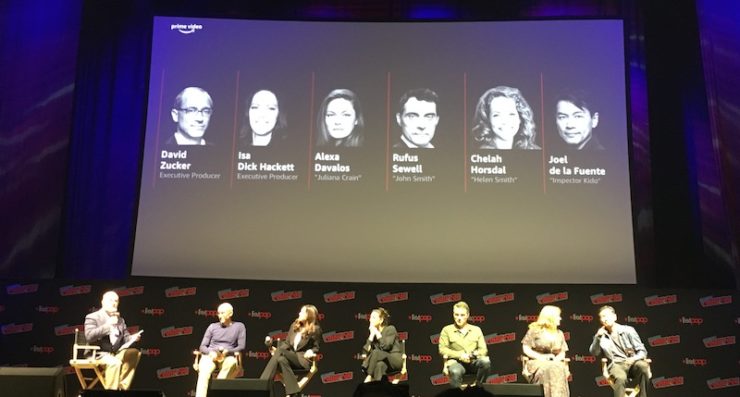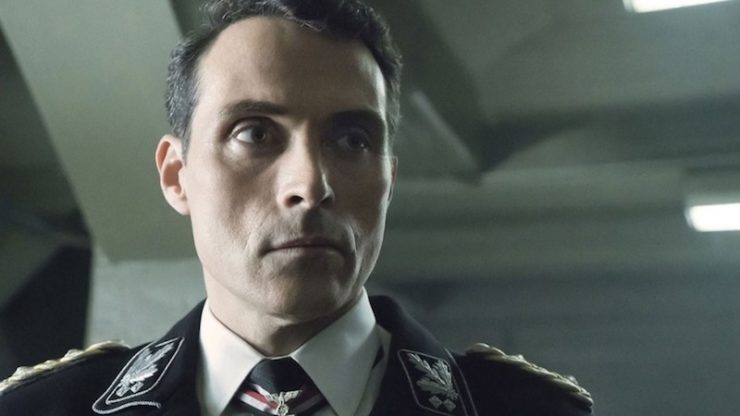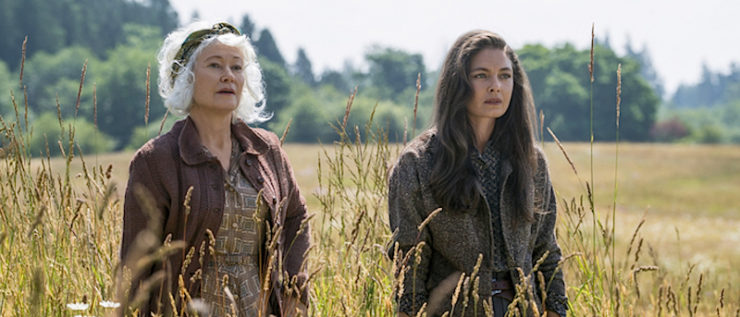The Man in the High Castle returns to Amazon today! One of the concerns I had coming into Season Three is that at this point they’re well beyond the scope of the original novel, and heading off into uncharted territory. While the show’s worldbuilding has always been exquisite, I was nervous that they wouldn’t be able to sustain it.
I got to see a sneak peek of episode one, “Now More Than Ever, We Care About You,” at New York Comic-Con last night, and I’m happy to say that for the most part, the opening hour of Season Three holds up to the previous seasons—and in a few moments, even surpasses them. I’m so excited to see where they take these characters. I’ll give you a largely spoiler-free discussion below, along with a few highlights from the panel discussion the followed the episode. I will be discussing events from the last two seasons, so watch out for potential spoilers if you’re not caught up!
First, a few moments from the panel!
Asked to speak to the strengths that help their characters survive, Alexa Davalos spoke of Juliana Crane’s skill at propelling herself forward, and that she’s learned to “use loss as a fuel.” Rufus Sewell, surprisingly, cited John Smith’s empathy—an ability that has been “perverted” by Nazism. “The quality itself is neither good nor bad. He can read people, and understand them, and he could just as easily use that empathy to make people happy.” Chelah Horsdal said that Helen Smith’s arc in this season would be “her returning to power as a mama bear and lioness,” while Joel de la Fuente mentioned Chief Inspector Kido’s “single-mindedness, that helps him weed out the things he prioritzes less.” He also reminded us that there’s no guarantee any of the characters make it out of this season alive, to a worried murmur across the audience.

Asked how far the show has gotten from the source material, Isa Dick-Hackett (one of the show’s executive producers and Philip K. Dick’s daughter) stressed: “We haven’t gotten away from spirit. It’s an anti-fascist novel; [fascism] was my father’s lifelong fear. We took two chapters from the sequel he was working on that we’ve utilized in Season Three.” She built on this a moment later, saying, “…resistance accompanies a lot of different forms…artistic, overtly political. We made a conscious decision at the beginning of the season to express [resistance] in different ways.” Showrunner David Zucker added, “This season embraces hope—we’re seeing where people’s inspirations to keep fighting come from, and how alternate worlds begin to directly confront their oppression.”
The panel then introduced a preview for Season Four, which has already begun filming, introducing us to new characters, played by Frances Turner and Clay Bennett, along with Jason O’Mara‘s Wyatt Price, who we meet in the Season Three premiere. It sound like Season Four will take us even further into the work of the Resistance… but in the meantime, I’ll give you my thoughts on the first episode of Season Three.
Season Three opens about six months after the cataclysmic events of Season Two’s finale, which I’ll briefly sum up below:
Obergruppenfuhrer John Smith exposed a plot against Hitler, engineered by Heusmann. His son, former double agent Joe Blake, got taken down with him. Juliana Crane shot her stepfather to fulfill the ending of one of the alt-universe films in the hopes that it would avert a nuclear war. She was also trying to save the life of Thomas Smith, John’s son, whose muscular dystrophy was going to be used as leverage against his father. Thomas figured this out, and turned himself in to be euthanized for the Reich. Juliana ended up fleeing to the Neutral Zone to see The Man in the High Castle, a mysterious Resistance leader named Hawthorne Abendsen who’s been distributing films with alternate outcome of World War II. Once he decided he could trust her, he burned most of his alt-universe film reels, and then as a capper, revealed that an alt universe version of Juliana’s dead sister was staying with him at his house. In the meantime Juliana’s ex, Frank Frink, spearheaded a terrorist attack on the Japanese kempeitai headquarters, and then possibly fled with his frenemy Childan, an antiques dealer. After all of that, a Resistance operative met up with Trade Minister Tagomi and gave him a small box of alt universe films.
As you can see, more happened in one hour of Man in the Hight Castle than in entire seasons of other shows. I’m pleased to say the that opening of Season Three grabbed all of these threads and ran with them, usually in some fabulous directions.
Now, ordinarily I don’t have much sympathy for Nazis. Unless you’re a literal child and don’t know any better, if you’re a Nazi you deserve to be punched, if at all possible by the glowing gay ghost of Alan Turing.
But that fucker Rufus Sewell and his majestic cheekbones have made me deeply sympathetic to Nazis.
Seriously. You can see his cheekbones from space.

John Smith, has just been promoted to Oberstgruppenfuhrer, and is keeping a tight lid on the grief he feels for his son, who turned himself in to be exterminated at the end of last season. His wife Helen isn’t keeping much of a lid at all—she’s marinating herself in a cocktail of pills and alcohol. She has to keep up appearances, and be proud of her boy’s sacrifice, but underneath that she is nothing but rage. If her husband hadn’t risen so high in the ranks it’s entirely possible they could have kept Thomas’ condition secret; and if John’s family’s blood wasn’t defective they never would have had this problem in the first place. Her daughters have entirely internalized the Reich’s teaching, of course, they’re proud of their brother, because they’re supposed to be.
The four actors have created a fascinating arc from the opening of Season One, when they were a picture perfect Nazi family, with Smith toasting his wife as the person with “the most important job in the Reich” and Helen keeping all the other Nazi ladies is line, and the girls being slightly bratty sisters to Thomas, while also occasionally being pushed into doing more housework and toeing a stricter line of behavior. It was a perfect study in the ways men wield power, and the ways women contort themselves around that power in order to have their own. The Smith’s marriage was also an eerily strong partnership. But now, with Thomas gone and the eyes of the Reich upon them, that partnership is in a shambles, and the two girls have gained their own power—not only are they the sisters of a martyr, but they’re The Future.
In what I think was the episode’s best moment, all of these fissures come to a head at a memorial for Thomas. Without spoiling anything, it’s an example of the wonderful tension the show can create; we feel the Smiths’ pain, and we care about them as characters, and then the show plays with a particularly chilling type of Nazi iconography and we remember all over again just how horrific this world is, and exactly which Devil the Smiths made a deal with when America fell.
We only check in with the Japanese Empire slightly in this episode, but the few scenes are packed with import. In one, the Trade Minister watches in horror as a new weapon is tested—understandably, the government is obsessed with keeping parity with the Reich. The other shows a tiny fraction of what the Empire has been doing to quell last season’s rebellions, and featured some reliably terrifying acting from Joel de la Fuente as Inspector Kido.
We catch up with Joe soon after the events of the Season Two finale, when his father’s plot against Hitler was discovered, and Joe himself was implicated. This storyline is all the more heart-wrenching since nearly everything Joe did was fueled by a need to please his father—then when he was finally reunited with the man he quickly had to navigate being one of the Lebensborn—the “perfect” children eugenically engineered to be the great hope of the Reich—and then to figure out whether his loyalty lay with The Fuhrer or his dad. As usual with Joe, he plays his cards so close to his chest that it’s almost impossible to suss out whose side he’s on, and of all the arc in this opening episode, his is the twistiest.

And what of Juliana Crane?
Returning to Juliana’s story gives us the closest thing we get to respite. After the insanity of last season, with Juliana’s defection to the Reich-controlled East Coast, and subsequent flight from the Nazis, she has landed in the Neutral Zone—otherwise known as the only part of the former U.S. that isn’t an utter nightmare. The Neutral Zone is the one place where races can mix easily, where Black and Indigenous Americans are at least somewhat safe, and where people can create music and write books without being censored by either empire. It was interesting to me how much I relaxed in these scenes—it’s fair to say that these were the only parts of the episode I “enjoyed” simply because I wasn’t knotted up with fear.
We meet a new character, Wyatt Price. An Irish refugee twice over, his family fled to New York during World War II, then fled to the Neutral Zone after the Nazis won the war, and now he seems to make his money as a black market dealer. He definitely has designs on Juliana.
And then we come to what might be the biggest new face: Juliana is now caring for an alternate universe version of her sister Trudy. In Juliana’s reality, Trudy was shot by the police for sedition. In this Trudy’s reality, it was Juliana who was killed. Now they try to piece a bond together from mismatched memories, all while Trudy’s mind fragments from being unstuck in reality. And yet… she doesn’t go back. Is it because she can’t? Or is it because she’d rather stay in a reality that has Juliana in it—even if it isn’t her Juliana?
This is where the show’s various threads tied together perfectly. In Trudy we have an example of pure PKD-ian sci-fi: she’s trapped between worlds, she doesn’t really know how to get back, her reality doesn’t feel real, and she’s begun having seizures because her brain can’t handle it. But she seemingly want to stay, on some level, because Juliana Crane glows with so much love that everyone wants to be near her. With a lesser actor this wouldn’t work, but Alexa Davalos is so good at embodying Juliana’s pure desire for good without ever making her seem naive or saccharine. This is a character who has suffered terrible loss, has put herself in mortal danger, but she still believes that humans can be good. She’s willing to sacrifice a family member to try to save the child of a Nazi. She’s willing to risk everything to shuttle films for the Resistance, all in the hope that she can make a better world.
When the show does this it reaches its full strength. When it gives us Juliana trying to keep her eyes on the future, Smith trying to hold his family together, and Tagomi working to broker peace, you get a show that has a heart beating under all of the espionage and alt-universe high wire work.
Leah Schnelbach would still rather be a pig than a fascist.










